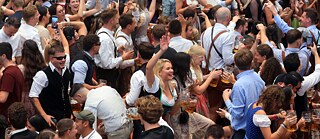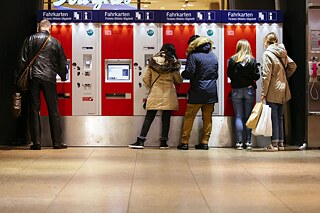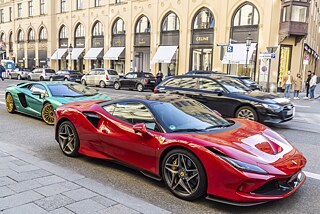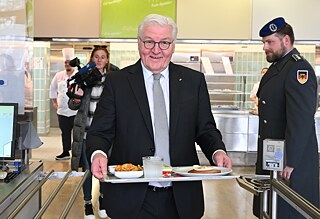Five typical German habits
That's how it's done here

No sense of humour, always overly punctual, taciturn and a little reserved – one nationality immediately pops into your head when you hear these descriptions: the Germans. The list could go on and on – here we look at five habits that are seen as “typically German”.
SUNDAY, 8:15 PM, TATORT
1.271! That's how many episodes of the crime series Tatort have flickered across our screens to date. It is the darling of the German living room landscape – and for some TV viewers as sacred as a church service. Mid-twenties watch it with the four of them in their smoky shared kitchens, while their grandmas and grandpas stare at the TV from their armchairs at the same time. Whether it's the veteran “Kommissarin Lena Odenthal” or the public's favourite “Professor Karl Friedrich Boerne, Gerichtsmediziner”: the names of their investigators mean more to Germans than those of their grandcousins. Even on dating apps, the crime scene finds its way into the profiles of love seekers. “This is non-negotiable for me: not being a Tatort fan!” or: “Typical Sunday: coffee, walk, Tatort.” Tatort and Germany, it's a match – here's to 1,271 more episodes!
Every Sunday: the series Tatort | Photo (detail): picture alliance / Geisler-Fotopress | Dwi Anoraganingrum/Geisler-Fotop
TICKETS, PLEASE!
As former German Chancellor Angela Merkel once said quite nicely: “The internet is uncharted territory for all of us.” However, she didn't say this in 1997, but in 2013, which says it all when it comes to Germans' attitude towards digitalisation. There are few places where this attitude is more evident than in the queues for sporting events and concerts or on the ICE train seats in Germany. Ticket control? It's a good thing I've got my proof in paper form with me. Ideally, the DIN A4 should also be wrapped in cling film. Whether it's the parents at the airport or the 18-year-old in front of the football stadium – better safe than sorry. You don't want to end up losing your QR code somewhere.
Somehow safer: a printed train ticket | Photo (detail): © picture alliance / Geisler-Fotopress | Christoph Hardt/Geisler-Fotopress
WHAT MODEL YEAR IS IT?
3 Series, 5 Series, 7 Series, 911, A-Class or Polo. The car is guarded like the apple of an eye. It doesn't matter whether it's a lovingly kept car with over 300,000 kilometres on the clock or the new family van. And if you love your car, you'll even push it, or so the saying goes. The fixation on four-wheeled vehicles is seen as one of the most typical German habits, especially abroad. If you don't polish your tyres to a high shine at the weekend, you're bound to get a glance or two from the neighbours. After all, what do you call a two-wheeled shopping trolley? Hackenporsche!
Munich's Maximilianstrasse: luxury cars and shop windows shine | Photo (detail): © mauritius images / Arnulf Hettrich / imageBROKER
Mahlzeit! Meal Time!
German cuisine is not exactly considered one of the finest. Nevertheless, one word echoes through the building site every day from 11 a.m. to 2 p.m., as it does through the office tower: meal time! Regardless of whether the other person is hungry or drowning in work. Between late morning and afternoon, everyone gets a meal. Even the boss's trainee. That's as sure as the amen (meal) in the church (company canteen). We've never seen each other before and we meet in the corridor on the fourth floor? Meal time!
Federal President Frank-Walter Steinmeier looks forward to his lunch in the canteen of the Bundeswehr Medical Academy | Photo (detail): © picture alliance/dpa | Britta Pedersen
FRESH WIND
Ever since the coronavirus pandemic, everyone has been familiar with the most German of all Olympic disciplines: airing windows. A separate science has developed around the targeted complete opening of one or more windows. Three or four times a day? How long in which seasons? Reading up on the subject would take half a degree in physics. Shock ventilation is typically German, shock ventilation is a must. Yes, even at minus 10 degrees in winter.
Someone has got it: Shock ventilation is a must! | Photo (detail): © Chris Barbalis | Unsplash